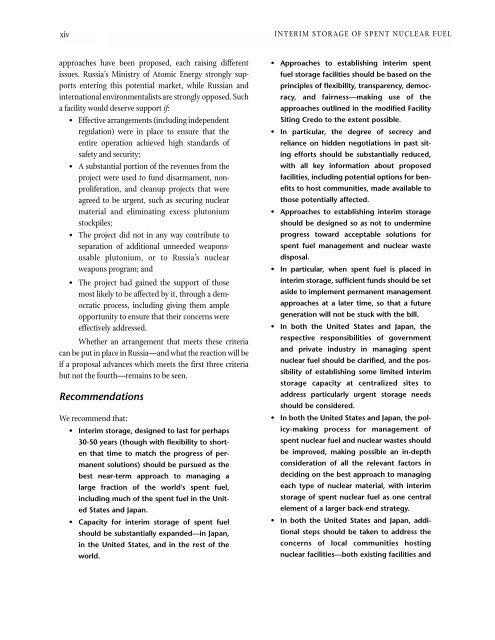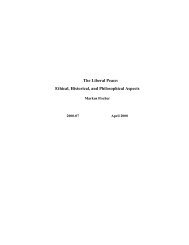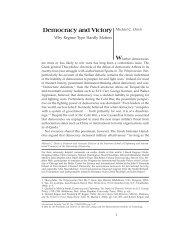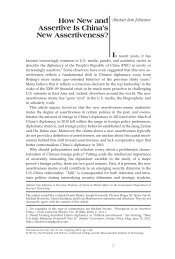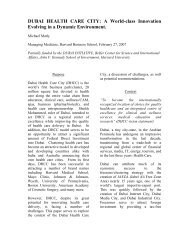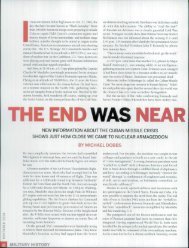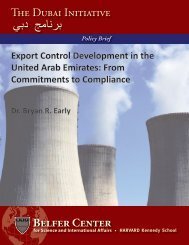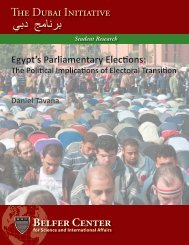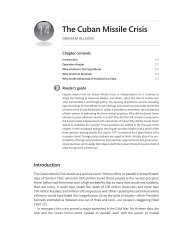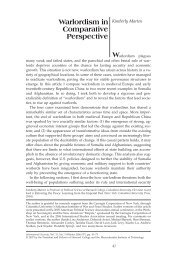Interim Storage of Spent Nuclear Fuel - Woods Hole Research Center
Interim Storage of Spent Nuclear Fuel - Woods Hole Research Center
Interim Storage of Spent Nuclear Fuel - Woods Hole Research Center
Create successful ePaper yourself
Turn your PDF publications into a flip-book with our unique Google optimized e-Paper software.
xiv<br />
approaches have been proposed, each raising different<br />
issues. Russia’s Ministry <strong>of</strong> Atomic Energy strongly supports<br />
entering this potential market, while Russian and<br />
international environmentalists are strongly opposed. Such<br />
a facility would deserve support if:<br />
• Effective arrangements (including independent<br />
regulation) were in place to ensure that the<br />
entire operation achieved high standards <strong>of</strong><br />
safety and security;<br />
• A substantial portion <strong>of</strong> the revenues from the<br />
project were used to fund disarmament, nonproliferation,<br />
and cleanup projects that were<br />
agreed to be urgent, such as securing nuclear<br />
material and eliminating excess plutonium<br />
stockpiles;<br />
• The project did not in any way contribute to<br />
separation <strong>of</strong> additional unneeded weaponsusable<br />
plutonium, or to Russia’s nuclear<br />
weapons program; and<br />
• The project had gained the support <strong>of</strong> those<br />
most likely to be affected by it, through a democratic<br />
process, including giving them ample<br />
opportunity to ensure that their concerns were<br />
effectively addressed.<br />
Whether an arrangement that meets these criteria<br />
can be put in place in Russia—and what the reaction will be<br />
if a proposal advances which meets the first three criteria<br />
but not the fourth—remains to be seen.<br />
Recommendations<br />
We recommend that:<br />
• <strong>Interim</strong> storage, designed to last for perhaps<br />
30-50 years (though with flexibility to shorten<br />
that time to match the progress <strong>of</strong> permanent<br />
solutions) should be pursued as the<br />
best near-term approach to managing a<br />
large fraction <strong>of</strong> the world’s spent fuel,<br />
including much <strong>of</strong> the spent fuel in the United<br />
States and Japan.<br />
• Capacity for interim storage <strong>of</strong> spent fuel<br />
should be substantially expanded—in Japan,<br />
in the United States, and in the rest <strong>of</strong> the<br />
world.<br />
INTERIM STORAGE OF SPENT NUCLEAR FUEL<br />
• Approaches to establishing interim spent<br />
fuel storage facilities should be based on the<br />
principles <strong>of</strong> flexibility, transparency, democracy,<br />
and fairness—making use <strong>of</strong> the<br />
approaches outlined in the modified Facility<br />
Siting Credo to the extent possible.<br />
• In particular, the degree <strong>of</strong> secrecy and<br />
reliance on hidden negotiations in past siting<br />
efforts should be substantially reduced,<br />
with all key information about proposed<br />
facilities, including potential options for benefits<br />
to host communities, made available to<br />
those potentially affected.<br />
• Approaches to establishing interim storage<br />
should be designed so as not to undermine<br />
progress toward acceptable solutions for<br />
spent fuel management and nuclear waste<br />
disposal.<br />
• In particular, when spent fuel is placed in<br />
interim storage, sufficient funds should be set<br />
aside to implement permanent management<br />
approaches at a later time, so that a future<br />
generation will not be stuck with the bill.<br />
• In both the United States and Japan, the<br />
respective responsibilities <strong>of</strong> government<br />
and private industry in managing spent<br />
nuclear fuel should be clarified, and the possibility<br />
<strong>of</strong> establishing some limited interim<br />
storage capacity at centralized sites to<br />
address particularly urgent storage needs<br />
should be considered.<br />
• In both the United States and Japan, the policy-making<br />
process for management <strong>of</strong><br />
spent nuclear fuel and nuclear wastes should<br />
be improved, making possible an in-depth<br />
consideration <strong>of</strong> all the relevant factors in<br />
deciding on the best approach to managing<br />
each type <strong>of</strong> nuclear material, with interim<br />
storage <strong>of</strong> spent nuclear fuel as one central<br />
element <strong>of</strong> a larger back-end strategy.<br />
• In both the United States and Japan, additional<br />
steps should be taken to address the<br />
concerns <strong>of</strong> local communities hosting<br />
nuclear facilities—both existing facilities and


